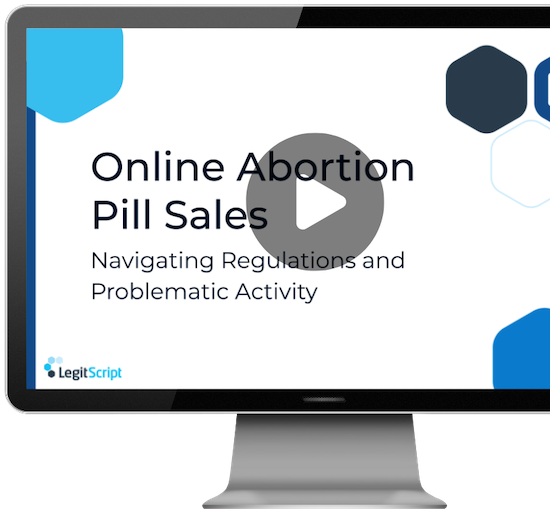The online sale of abortion medication is at the center of a rapidly evolving regulatory and risk environment. In LegitScript’s June 2025 webinar, Online Abortion Pill Sales: Navigating Regulations and Problematic Activity, experts outlined how recent legal changes are reshaping access to medication abortion and highlighted emerging threats facing online platforms and payment service providers (PSPs).
Read a summary of the presentation below, and then watch the webinar on demand.

June 17, 2025 | by LegitScript Folks
The Regulatory Landscape: A Shifting Legal Terrain
The U.S. regulatory framework surrounding abortion medication has changed dramatically since the Supreme Court’s 2022 decision in Dobbs v. Jackson Women’s Health Organization, which overturned Roe v. Wade and returned the authority to regulate abortion to individual states. Today, more than a dozen U.S. states have total abortion bans, with many others imposing gestational limits as early as six weeks.
Mifepristone and Misoprostol
Medication abortion, which accounts for more than 60% of U.S. abortions, primarily involves two drugs: mifepristone and misoprostol. Both are prescription-only; mifepristone is subject to the FDA’s Risk Evaluation and Mitigation Strategy (REMS) program, which serves to prevent, monitor, and manage specific serious risks associated with certain drugs. During the COVID-19 pandemic, the FDA relaxed REMS restrictions to allow telemedicine prescribing, spurring a sharp rise in telehealth abortions — from 4% of all abortions in April 2022 to 20% by mid-2024.
States and Shield Laws
States are increasingly at odds. Shield laws in roughly 20 states aim to protect providers offering care to out-of-state patients, while others, like Texas and Louisiana, have attempted to prosecute such providers. These jurisdictional conflicts raise complex legal questions and introduce real risk to intermediaries like platforms and PSPs.
Legal Action
At the federal level, litigation such as FDA v. Alliance for Hippocratic Medicine and Missouri et al. v. FDA has targeted the legitimacy of mifepristone’s approval and REMS modifications. While the Supreme Court recently dismissed the former case on standing grounds, the regulatory debate is far from settled.
International Laws
Internationally, the legal landscape is equally varied. Countries like Brazil and Indonesia tightly restrict or criminalize abortion, yet misoprostol is widely available through illicit online channels, often sold under misleading labels or aliases. Other countries like South Korea have legalized abortion but have yet to approve medications for the procedure.
Problematic Sales and Illicit Activity Online
One of LegitScript’s research and investigative experts showcased how rogue sellers are adapting to enforcement efforts by adopting increasingly evasive tactics. These include:
- Stealth promotions: Seemingly innocuous videos and product listings are embedded with code words and drug nicknames. These vendors often promote themselves online but conduct sales through secure messaging apps.
- Rogue networks: Websites offering unapproved abortion medications are often linked to broader illicit networks. One example given is Rablon Healthcare, a group of over 30 abortion-focused rogue pharmacy websites. Rablon’s operator is on the FDA's Most Wanted Fugitive list, with documented violations including shipping unapproved drugs with false customs declarations.
- Information-rogue hybrids: Some popular social media posts and websites intended to provide abortion information also link, perhaps inadvertently, to rogue pharmacies offering unapproved or unsafely distributed drugs.
These examples demonstrate that violative content is not always overt. In many cases, well-meaning content creators may unknowingly route users to highly risky or illegal services.
Why This Matters for Online Platforms and Payment Providers
Both online platforms and PSPs face escalating exposure. For platforms, the risk lies in hosting or amplifying content that promotes rogue pharmacies or unsafe abortion access, intentionally or otherwise. Section 230, which helps protect internet platforms from liability from user-generated content, may apply in many cases, but growing political and public scrutiny makes this a moving target.
For payment service providers, facilitating transactions tied to unlicensed pharmacies or sales of unapproved drugs could trigger enforcement action, litigation, or reputational damage. Shield laws could potentially offer some protection, but they don’t eliminate regulatory risk, especially in states hostile to abortion access.
In both cases, the fragmented and fast-changing legal environment demands careful navigation and proactive monitoring.
Tools and Strategies to Mitigate Risk
To help PSPs and platforms protect themselves and their users, these are some tips on spotting potentially problematic content:
- Monitor evolving slang and hashtags used by sellers to evade detection (e.g., #ab0rtshun, #cyto, #mife).
- Review shipping claims to ensure products are approved and vendors licensed in all jurisdictions.
- Search contact information for association with rogue pharmacies.
These steps are especially critical for teams responsible for trust and safety, platform integrity, and merchant compliance.
Get Customized Intelligence with a Risk Landscape Report
LegitScript’s Risk Landscape Reports offer deep-dive research and analysis on specific threats, tailored to your platform or payments ecosystem. These reports combine policy expertise with forensic intelligence to provide:
- A clear overview of the relevant regulatory environment
- Detailed findings of violative activity specific to your platform
- Insight into evasion tactics and threat network structures
Learn more about Risk Landscape Reports or contact us about viewing a free sample report.
Disclaimer
This webinar was presented on June 11, 2025, and reflected certain information about the topics discussed known to LegitScript as of that date. The legal, regulatory, payments, and political environments on this topic are rapidly evolving. If you watch a recording of this webinar at a later time, please be aware that laws, regulations, and enforcement priorities may have changed. You should seek independent and up-to-date legal or regulatory guidance before making any legal, compliance, or business decisions.
Nothing in the webinar or in this post should be considered comprehensive guidance, business, or legal advice. The information presented in the webinar does not necessarily reflect the views and opinions of LegitScript or the individual presenters. The information in this webinar is meant for informational purposes only, is not a substitute for qualified legal advice, and is meant solely to support discussion.




